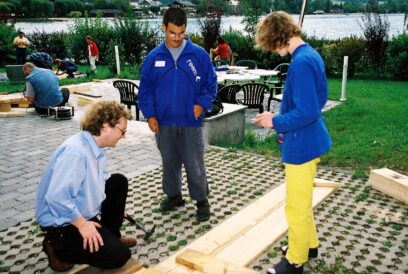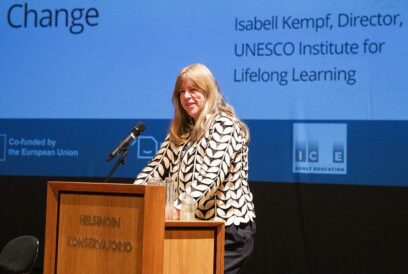

Does education lead to better health, or are healthier people more likely to educate themselves?
Does education lead to better health, or are healthier people more likely to educate themselves?
There is a two-way relationship between education and health. Lifelong learning opportunities are key to better health and social equality.
Our health is about much more than being able-bodied and free from illness.
The World Health Organization defines health as a state of complete physical, mental and social well-being and not merely the absence of disease or infirmity.
Statistical evidence and research prove that there is a strong connection between education and health: better educated people live longer and healthier lives than others.
However, given the broadness of the definition of health and the myriad of learning possibilities in our societies, we still do not have a full understanding of this connection. Why is education good for our health?
This article presents views from two education experts: Dr Ricardo Sabates from the University of Cambridge describes the health benefits of education in general and on a societal level, and Professor Jyri Manninen from the University of Eastern Finland focuses on the health benefits of non-formal, non-vocational adult education.
Four pathways to better health
Dr Sabates, Reader in Education at Cambridge, says that education can lead to health benefits via four different pathways.
One of them is the income effect: a higher level of education leads to a better income, which can result in alternative access to health care services, in particular in market-oriented health care systems.
Another way that education affects us is by raising our awareness of the importance of good health. This in turn can make us change the way we live, and for example reduce risky health behaviours like smoking or heavy drinking.
Furthermore, Dr Sabates says that education also has an important impact on the self – how we feel about ourselves and our abilities to affect our lives.
“This is incredibly important to us. Education increases self-worth, self-esteem and confidence. This enables us to feel that we are in control of our own decisions and destinies”.
Lastly, Dr Sabates names the ability to communicate and claim your right. People with more education are able to know how to navigate the complexity of health care systems. It is also easier for them to communicate with health practitioners on a special topic.
“And they are also more likely to claim their rights: to say, I’m really sorry but I don’t think this is right, I still don’t feel well. Education reduces the social distance between the patient and the knowledgeable health practitioner”.
Mental well-being leads to physical health
Professor Jyri Manninen, Head of the Lifelong Learning and Adult Education Programme at the University of Eastern Finland, has studied the benefits of non-formal, non-vocational adult education, which he refers to as liberal adult education to emphasise its voluntary nature.
The Benefits of Lifelong Learning study, partly led by Prof. Manninen, found that the most visible health impact of participating in liberal adult education is increased mental well-being. (Read more about this subject here.)
“Adult learning has a direct positive effect on mental well-being. However, when people feel better mentally, they also begin to pay more attention to their health, and this can ultimately lead to better physical health,” Prof. Manninen says.
It seems that just getting out of the house and attending a social activity is good for you.
Like Dr Sabates, he also notes the importance of the psychosocial influence of education.
According to him, learning experiences in a social environment give both social interaction and small experiences of achievement. These build social capital, self-efficacy and a sense of control of your own life, which in turn promotes well-being in daily life and thus increases mental well-being.
Adult education centres, folk high schools and other non-formal educational organisations also offer plenty of courses, which have a direct impact on physical health, such as dancing, pilates or water exercises for the elderly.
Prof. Manninen is currently conducting a follow-up study, which assesses the well-being benefits of learning in an adult education centre where about half of the available courses are physical exercise.
“Surprisingly, we are getting similar, positive results on self-reported health, regardless of whether it is a physical exercise class or a foreign language course. It seems that just getting out of the house and attending a social activity is good for you,” he says.
Building a healthier, more equal society
Non-formal, non-vocational adult education providers are an important part of the educational system in many countries, because they offer opportunities for lifelong learning, regardless of the learners’ education level.
One unique aspect of the various courses is that they are stress-free occasions with easy access and no strict grading. Prof. Manninen says that this is extremely important:
“When people volunteer to learn about a subject they have a natural interest in, they are more likely to be motivated and enjoy the learning experience”.
Dr Sabates sees non-formal adult education as one way of tackling social issues.
According to him, the health benefits of education are not important just because they can lead to better individual health, but also because inequalities in health and income within countries are increasing.
“When people feel that they do not live in a fair society, it creates anger and social dissatisfaction, which can lead to lack of social cohesion and more crime.”
Education and health both have an effect on each other.
Dr Sabates explains that this is where education and lifelong learning have an important role to play: in equalising our societies, providing second-chance opportunities and reducing the gap between the haves and have nots”.
Which came first, the chicken or the egg?
We know that there is a clear correlation between education and health. Well-educated people – and according to Prof. Manninen’s research, also people who take part in non-formal, non-vocational adult education – are healthier than average.
But does education lead to better health, or are healthier people more likely to educate themselves?
The question is difficult to answer because of reverse causality: education and health both have an effect on each other.
For example, Dr Sabates explains, good health in childhood leads to better learning at school, which results in better education and health during adulthood. And yet, health during childhood is affected by the education of the parents.
“In theory it is easy to say that education affects our health. The problem is how to prove it, how to get the empirical evidence of the way it works, in order to influence policy-makers”.
Dr Sabates is hopeful that the question can be answered in the future.
“We have good longitudinal datasets on education and health, especially in Europe. By studying them, we can see how the feedback loops of education are working”.





